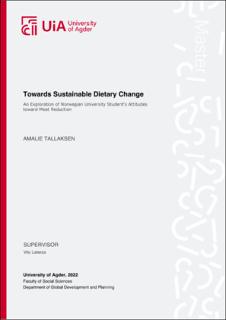| dc.description.abstract | The current food system is associated with various environmental implications. The meat the industry has been recognized as a substantial contributor to these environmental implications and places enormous strain on ecosystems. A shift toward more sustainable diets, such as plant-based and low-meat diets have therefore been emphasized as a significant component of climate change mitigation. By combining results from individual interviews and focus group interviews, this master thesis investigates whether Norwegian university students are aware of the environmental impacts connected with meat consumption and explore their attitudes toward sustainable dietary change.
The finding demonstrates that students lack sufficient knowledge of the interconnected and problematic consequences of the meat industry. The results further highlight the significance of habits and sociocultural aspects that influence the type and amount of meat consumed by students. Meat substitutes and plant-based alternatives have an essential role when examining students’ willingness to reduce their meat intake. Prices, convenience, and skills of meat substitutes are also considered significant impediments to sustainable dietary change. The study draws upon the Intention-Behavior Gap and The Theory of Planned Behavior as a theoretical framework for understanding students' inconsistency between intentions and their actual meat consumption behaviors.
According to the findings, being unaware of the pressing concerns diminishes the probability of consuming less meat for environmental reasons. Comprehending social perceptions around meat consumption is a prerequisite for effectively transitioning to a more sustainable source of food. Improved information dissemination, media attention, and education on the benefits of plant-based diets may enhance societal knowledge and promote the acceptability of sustainable dietary change. The study concludes that achieving nutritional and environmental sustainability will necessitate a considerable amount of effort from a wide range of stakeholders including structural changes, supportive legislation, technology innovation, as well as consumer willingness for change. | |
